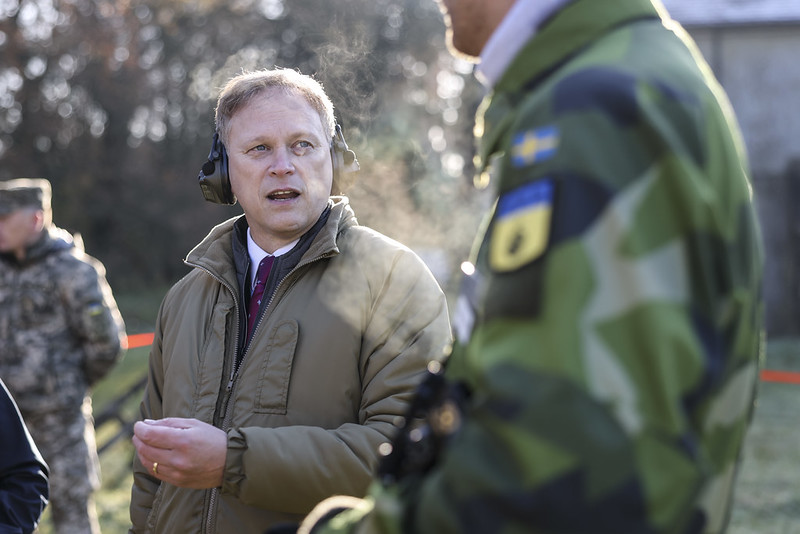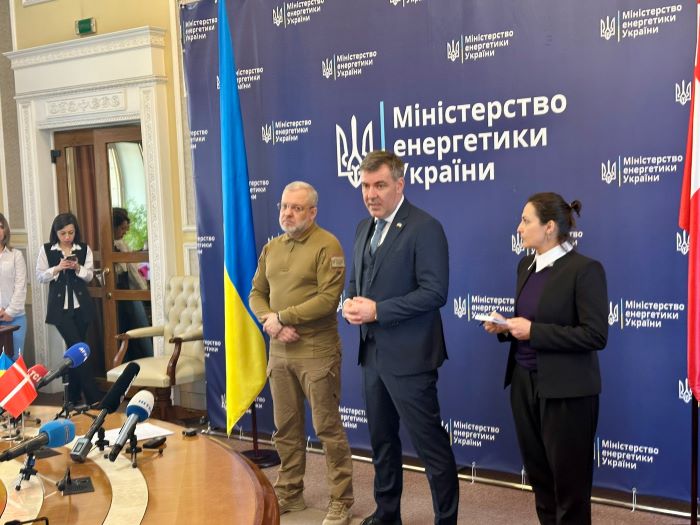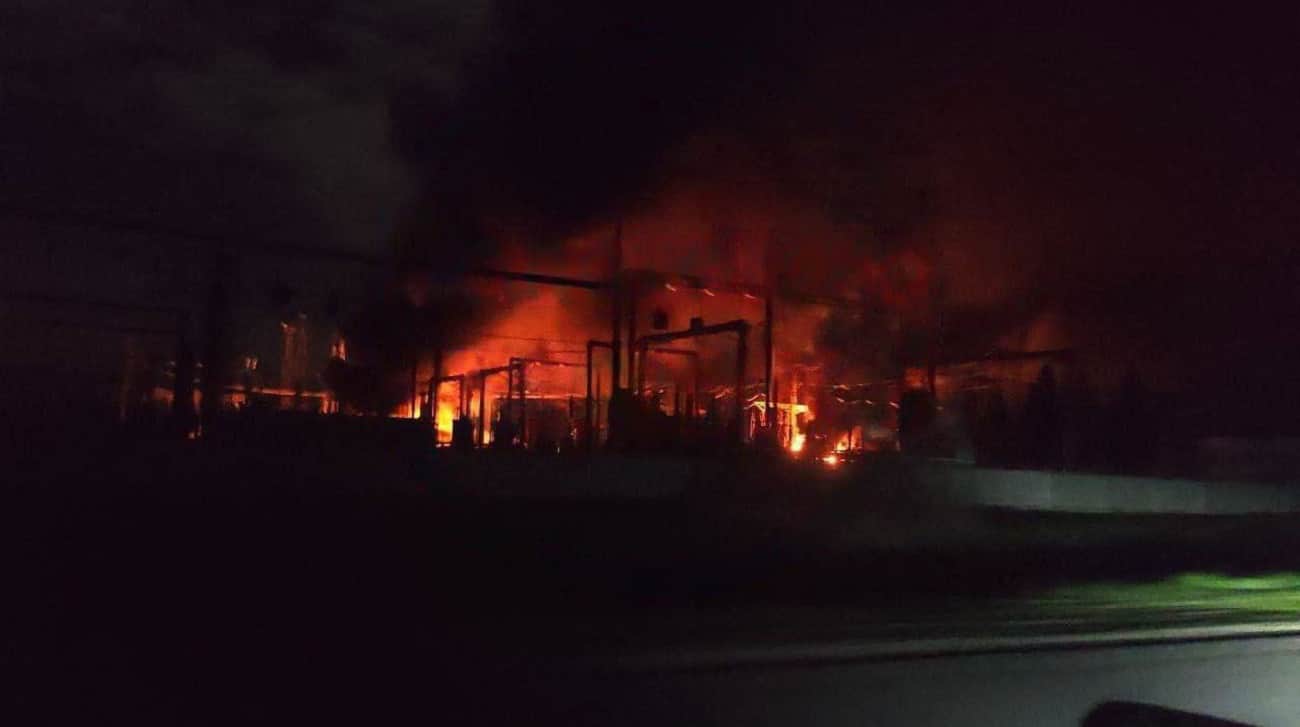UK Minister declares end of “peace dividend” era in historic speech
The post-war world moves to a pre-war one, and Ukraine is a test case, says Grant Shapps, announcing massive defense boost The post UK Minister declares end of “peace dividend” era in historic speech appeared first on Euromaidan Press.

On 16 January, UK Defence Minister Grant Shapps delivered a historic speech at Lancaster House. Similar in its effect to German Chancellor Scholz’s groundbreaking announcement of a Zeitenwende and a new era of Russian relations, Shapps acknowledges that Europe and the world is moving from a post-war world to a pre-war one.
He says that the UK has started building a 100-year alliance with Ukraine, that the UK must lead and deter to stand up for its values around the world, and that Ukraine, which is fighting an existential battle, is a test case for whether the growing axis of autocracies will expand and wreak more conflict around the world.
You can read the full text here – it is very well worth reading. We provide you a shortened version that focuses on his key geopolitical statements.
Thirty-five years ago, Margaret Thatcher gave a short speech here in Lancaster House. She spoke of her optimism about the changes taking place between East and West. Barely two weeks later the Berlin Wall fell.
It was the dawn of a new era. Existential threats were banished. And a new global feel good factor spread to Defence. This was the age of the peace dividend. The notion that while our defences should be maximised at times of tension they could be minimised in times of peace.
Conflict didn’t disappear of course. But with no great power menacing the continent, peace gave the impression of being just around the corner.
Yet, not everyone got the memo. In fact our adversaries were mobilising.
The belligerent autocratic state was making a comeback – having got away with the illegal annexation of Crimea in 2014, Putin launched his brutal invasion of Ukraine eight years later.
And as Russia continues its illegal campaign in Ukraine, China is assessing whether the West loses its patience. Today, Russia and China have been joined by new nuclear, and soon to be nuclear, powers. North Korea promising to expand its own nuclear arsenal. And then there is Iran, whose enriched uranium is up to 83.7%, a level at which there is no civilian application.
Back in the days of the Cold War there remained a sense that we were dealing with rational actors. But these new powers are far more unstable, and irrational.
Can we really assume the strategy of Mutually Assured Destruction that stopped wars in the past will stop them in future, when applied to the Iranian Revolutionary Guard or North Korea? I am afraid we cannot.
For example, we have seen how Iranian proxies are causing havoc from Israel to the Red Sea. That Russia has what the two countries describe as a “no limits partnership” with China – with whom they conduct regular joint exercises. Meanwhile, Putin is relying on Iranian drones and North Korean ballistic missiles to fuel his illegal bombardment in Ukraine. […]
Put it all together, and these combined threats risk tearing apart the rules-based international order – established to keep the peace after the Second World War.
Today’s world then, is sadly far more dangerous. […] Nation states plus non-state actors with greater connections between them plus more creative weapons all adds up to more trouble for the world.
Over the last decade this government has made great strides to turn the Defence tanker around.[…]
We’ve uplifted our defence spending – investing billions into modernising our Armed Forces and bringing in a raft of next generation capabilities, from new aircraft carriers to F35s; from new drones to Dreadnought submarines; from better trained troops; to the creation of a national cyber force.
And when the world needed us, we have risen to the moment. Giving Ukraine our unwavering support and galvanising others to their cause, including with our biggest ever funding package, announced last week.
Taking action, we work to stamp out the global ambitions of Daesh. We’ve acted at the forefront of global responses to maintain regional stability after October 7th by sending a Royal Navy Task Group, a company of Royal Marines, surveillance planes and lifesaving aid to Gaza. And taking a lead role within global forces to protect freedom of navigation in the Red Sea.
Not only that but we’ve strengthened Britain’s place in the world with expanded partnerships from the Gulf to the Indo-Pacific.
We’re playing a major part in stirring the West into a renewed commitment to defence, using our 2014 NATO summit in Newport to bring Alliance nations together to stop the rot, by committing to spending 2 per cent of GDP on Defence.
Today, for the very first time this government is spending more than £50bn a year on Defence in cash terms, more than ever before. And we have made the critical decision to set out our aspiration to reach 2.5% of GDP spent on defence. And as we stabilise and grow the economy, we will continue to strive to reach it as soon as possible.
In five years’ time we could be looking at multiple theatres involving Russia, China, Iran and North Korea. Ask yourselves – looking at today’s conflicts across the world – is it more likely that the number grows, or reduces? I suspect we all know the answer – it’s likely to grow. So, 2024 must mark an inflexion point.
For Ukraine, this will be a year when the fate of their nation may be decided. For the world, this will be the greatest democratic year in history with nearly half of the world’s population going to the polls. And for the UK it must also be a moment to decide the future of our national defences. The choice is stark.
Some people, especially on the left, have a tendency to talk Britain down. They believe Britain can no longer have the power to influence world events. That we should somehow shrink into ourselves and ignore what’s happening beyond our shores.
I passionately believe these unpatriotic, Britain belittling doom-mongers are simply wrong. Their way would lead us sailing blindly into an age of autocracy. So we must make a different choice. And the history of our great island nation shows us the way.
Britain has often accomplished the seemingly impossible before. Our history is littered with moments when we faced down the threat and triumphed.
But looking ahead, we are in a new era and we must be prepared to deter our enemies, lead our allies, and defend our nation. In terms of deterrence, it’s about the UK gaining a strategic advantage over our enemies. The foundation of that advantage is, of course, our nuclear enterprise. At a time of mounting nuclear danger, our continuous at sea deterrent provides the ultimate protection.
And that’s why we are spending around £31bn to bring in next generation Dreadnought submarines and upgrade our deterrent.
In a more contested world, we need to bring that same goal of deterrence to our conventional forces – so we have made modernisation a critical priority. Taking the long-term capability decisions we need to transform our Armed Forces into a formidable deterrent. Enabling them to maintain the UK’s strategic advantage and empowering them to be able to deliver the outcomes we need in multiple theatres at once.
The growing success of that work was powerfully shown last week when, in less than 24 hours, the UK was able to both take action to defend ourselves against the Houthis and uplift our support to Ukraine to new record levels.
If Putin thought we’d be distracted by the events in the Middle East then last week, because of the long-term decisions this government has taken, his hopes were surely dashed. In a complex world, no nation can afford to go it alone, so we must continue strengthening our alliances so the world knows they cannot be broken. […]
I can announce today that UK will be sending some 20,000 personnel to lead one of NATO’s largest deployments since the end of the Cold War, Exercise Steadfast Defender.
It will see our military joining forces with counterparts from 30 NATO countries plus Sweden, providing vital reassurance against the Putin menace.
[…]
But NATO is only part of our rich tapestry of partnerships. And this government has taken bold decisions to embark on the partnerships we need to defend ourselves from a more dangerous world.
We are rapidly building our AUKUS partnership. And last month I signed our Global Combat Air Partnership (or GCAP) with Japan and Italy.
These projects are not just about building nuclear powered subs, sixth generation fighter planes, and innovating in all forms of Defence. They are about sharpening our strategic edge so we can maintain our advantage over our adversaries. They are precisely the deep relationships needed to preserve national and regional security. And they’re emblematic of the way we will work in the future.
But it’s not enough to deter. We must lead. Standing up for our values around the world. And Ukraine is a test case. This year, its future may well be decided.
British leadership has already had a galvanising effect. We’ve convened some 10 countries to help Ukrainians train here in the UK. And today I can announce that our programmes have now trained over 60,000 Ukrainian troops since Russia launched its invasion of Ukraine in 2014.
Last month, I launched a new maritime coalition with Norway to defend Ukraine’s maritime flank. Since then, over 20 partner nations have joined that coalition. But the international community cannot let this support slip.
Putin believes the West lacks staying power. And since the future of the world order is at stake, we must prove him wrong.
Rewarding his war with victory would only increase the risk of escalation. Not only because he’s hell bent on rebuilding the Russian empire. But because it would signal weakness to other would-be aggressors.
That is why on Friday the Prime Minister signed the historic UK-Ukraine Agreement on Security Cooperation. The start of a 100-year alliance that we are building with our Ukrainian friends.
It sees us increasing our military support to £2.5bn – taking the total of UK military aid to more than £7bn. With even more gifted directly from the UK’s equipment inventory.
£200m will be pressed into producing and procuring thousands of drones, including surveillance and long-range strike drones. This continues the UK’s proud record as a leading donor – always being the first to get Ukraine exactly what they need.
The UK was the first to provide Ukraine with weapons training, the first to provide NLAW anti-tank missiles, the first to give modern tanks, the first to send long range missiles.
Now we will become the largest provider of drones too. These will be manufactured here in the UK in tandem with international partners, helping to enhance our unmanned vehicle capabilities at home too.
But our new agreement with Ukraine is about so much more than money. It formalises our support in everything from intelligence sharing and cyber security to medical and military training. And it sees us taking the first giant step towards a century long partnership.
So, deter and lead, which brings me to the final essential element of being prepared. Defending our nation.
If we are to defend our homeland, we must ensure our entire defence eco-system is ready.
Firstly, we must make our industry more resilient to empower us to re-arm, re-supply and innovate far faster than our opponents. There’s a huge opportunity here for British industry.
Today our adversaries are busily rebuilding their barriers. Old enemies are reanimated. New foes are taking shape. Battle lines are being redrawn. The tanks are literally on Europe’s Ukrainian lawn. And the foundations of the world order are being shaken to their core.
We stand at this crossroads – whether to surrender to a sea of troubles, or do everything we can to deter the danger. I believe that, in reality, it’s no choice at all. To guarantee our freedoms, we must be prepared.
Prepared to deter – the enemies who are gathering all around us. Lead our allies in whatever conflicts are to come. Defend our nation whatever threat should arise. This is what Britain has always done. And it is what we must do again if we, like Margaret Thatcher speaking here 35 years ago, are once more to dream of a future without walls.
Compare to Scholz’s 2022 speech, hailed as groundbreaking for Germany’s relations with Russia:
Germany’s Steinmeier announces new era of Russia relations in historic speech
The post UK Minister declares end of “peace dividend” era in historic speech appeared first on Euromaidan Press.



